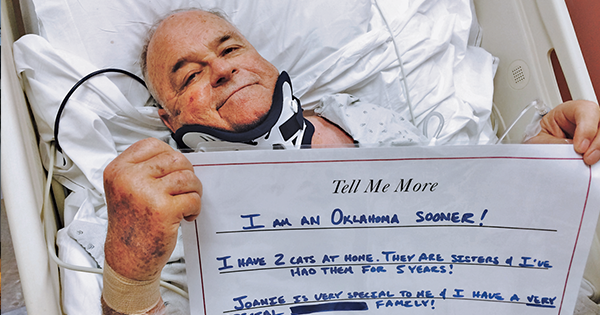
A medical chart might tell a doctor that her patient is a 65-year-old male admitted for myocardial infarction, and that he has elevated blood glucose and possible ischemic colitis. But the patient knows only that he passed out and woke up in the hospital, that everyone is saying he had a heart attack, that he has been thirsty a lot lately, and that his gut hurts. He is worried about his wife, and odd as it may sound, he would really like to watch the Oklahoma Sooners football game on Saturday.
If the doctor could see her patient as a person who is suffering instead of as a set of medical conditions, she might become more empathetic. That is the goal of Tell Me More, a simple idea that started on Valentine’s Day 2014, when medical students at New York City’s Mount Sinai Hospital asked patients or their loved ones three personal questions (How would your friends describe you? What are your strengths? What has been the most meaningful experience in your life?) and displayed the answers on posters near their beds.
In the emotionally charged setting of a hospital, small talk can have a big effect. Med student Marie Oliva Hennelly says the signs helped her “know who we’re fighting for.” She says that one inspiration for the program was a poem by a doctor, Brenda Butka, published in JAMA in 2012, which ends, “Tell me about your father.”
Tell Me More is being tested through the Get Well Network, an online service that gives patients more ways to participate in their own care. Get Well is adding the three questions and follow-up surveys to its touch-screen portal used by patients, doctors, and nurses at participating hospitals. But medical students will still conduct face-to-face interviews, and signs will still be posted in hospital rooms to encourage informal interaction. The research will measure how students’ levels of empathy change before, during, and after participation in the program.
“Hospital workers are all trained in separate silos,” says Ellen Swartwout, a nurse who directs research and analytics for the Get Well Network. “We want to see whether Tell Me More helps medical professionals think in a more holistic way about their patients while also giving patients a bigger role in their treatment.”

